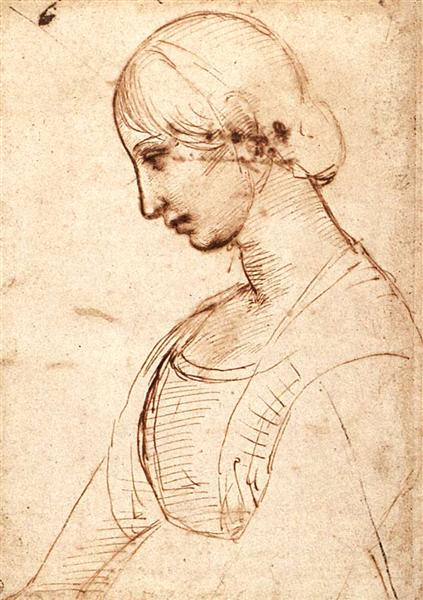描述
The "Portrait of a Young Woman," painted by Raphael in 1507, is a work that encapsulates the artistry of the Italian Renaissance and the mastery of portraiture in painting. Raphael Sanzio, known for his ability to capture the essence of the human being and the nuances of emotion, offers in this piece a portrait that goes beyond the superficial, allowing observers to glimpse the personality and inner life of the woman depicted.
The composition of the work is one of subtle elegance. The young woman's figure is positioned at a slightly turned angle, creating a sense of movement within the stillness of the portrait. Her face, illuminated by a soft light that highlights her features, is the central focus of the work. The texture of her skin, painted with a palette that mixes warm and cool tones, shows Raphael's skill in using oils to achieve a naturalistic depiction. The young woman, with dark, wavy hair, is dressed in an elaborate headdress that frames her face, suggesting an undertone of nobility and social status. The choice of her clothing, with rich shades of red and blue, not only highlights her figure, but also suggests a connection to the fashion traditions of the elite of the period.
One of the most fascinating features of this portrait is the woman's gaze. Her eyes, large and expressive, seem to penetrate the surface of the canvas, establishing an almost intimate bond with the viewer. This visual interaction is representative of the humanistic approach that Raphael and his contemporaries promoted, emphasizing the individuality and psychology of the sitter. Unlike many portraits of the period that could enunciate an ideal of beauty in a cold and distant way, there is a palpable connection here. The young woman is not just a representation of beauty, but embodies a mystery, a story of her own that invites speculation.
The soft, neutral background surrounding the figure is a clever compositional device that focuses almost all attention on the woman. This contrast between the background and the figure serves to accentuate not only her clothing, but also the emotional depth that emanates from her countenance. Through this simplicity in the background, Raphael shows the mastery he possessed over the relationship between the figure and its surroundings, drawing attention and interpretation to what really matters: the character of the person portrayed.
This portrait is not only a work in itself, but it also reflects the cultural and artistic context of the Renaissance. Raphael, as part of the triad of great masters alongside Leonardo da Vinci and Michelangelo, was going through a time in which the exploration of the individual and his psychology became relevant. His technique, moreover, was violent towards a fluid use of paint that translates into delicate shadows and subtle lights, resulting in a three-dimensionality that was revolutionary for its time.
Although we know little about the specific identity of the young woman portrayed, her enigmatic presence ensures that this work remains an object of study and admiration. With an undercurrent of mystery and a technical approach that reveals the full skill of a young Raphael, the "Portrait of a Young Woman" is a testament to Renaissance art and the profound humanity that this master sought to capture in his works. It undoubtedly stands as an invaluable example of the potential of portraiture to communicate not only appearance, but the essence of the individual.
KUADROS ©, a famous painting on your wall.
Hand-made oil painting reproductions, with the quality of professional artists and the distinctive seal of KUADROS ©.
Painting reproduction service with satisfaction guarantee. If you are not completely satisfied with the replica of your painting, we will refund 100% of your money.

